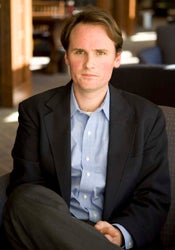This week, HLS Professors John G. Palfrey, Jonathan Zittrain, and HLS Climenko Fellow and Lecturer on Law Andrew K. Woods each weighed in on the Egyptian government’s recent decision to block Internet access to prevent the use of social media outlets in light of escalating protests in the country.
John G. Palfrey – New York Daily News
In a Jan. 31 article in the Opinion section of the New York Daily News online, HLS Professor John G. Palfrey addresses the issue of corporate responsibility in the wake of the Egyptian government’s recent Internet access lockdown to prevent protesters from organizing against President Hosni Mubarak’s regime.
Palfrey recognizes that, while social media sites such and Twitter and Facebook are effective tools in enabling such protests, the companies that provide these services may not be doing enough to lessen the ability of repressive regimes to control them.
Palfrey is the vice dean of library and information resources at Harvard Law School, and faculty co-director of the Berkman Center for Internet and Society at Harvard University. His most recent book (with Urs Gasser) is Born Digital: Understanding the First Generation of Digital Natives (Basic Books, 2008).
Jonathan Zittrain – Marketplace by American Public Media
HLS Professor Jonathan Zittrain joined Marketplace on Feb. 1 to discuss the unprecedented territory set by the Egyptian government’s decision to block most Internet and cell phone access in the country.
“It’s extremely rare to see a place that has had meaningful Internet saturation, and then just wanting to take it away,” Zittrain said. “The closest examples we’ve seen have been either places that don’t want it to begin with because they’re all too aware of how destabilizing it can be – that’s a North Korea, that’s a Cuba – or it’s places that for very brief periods of time cut off things like SMS – we saw it in Myanmar during the protests in Burma … other than that, this is … new turf.”
Zittrain is co-founder and faculty co-director of the Berkman Center for Internet and Society, and professor of computer science at Harvard’s School of Engineering and Applied Sciences. He is the author of The Future of the Internet — And How to Stop It (Yale University Press, 2008).
Andrew K. Woods – New York Times
In a Feb. 1 article in the Opinion Pages of the New York Times HLS Climenko Fellow and Lecturer on Law Andrew K. Woods analyzes the influence of social media on modern political activism.
Woods argues that although social media tools like Facebook or Twitter cannot replace “good old-fashioned activism,” they can have a powerful effect on an institution’s status quo simply by revealing it. Social media not only provide activists with a tool for quick coordination; they also offer activists a powerful opportunity to build solidarity on specific issues among their peers, fighting the phenomenon of pluralistic ignorance.
Woods is a Climenko Fellow at Harvard Law School, where he teaches legal research and writing. His research and scholarship focuses on the implications of behavioral insights for international law and politics. His law review article, A Behavioral Approach to Human Rights, was published in the Harvard International Law Journal in 2010.
